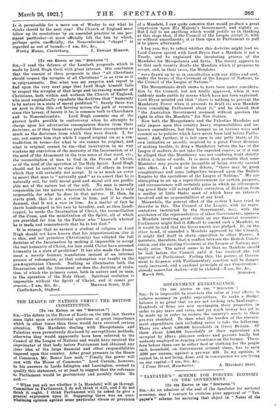[To THE Eamon or ma " Seim-mos."]
read the defence of the Lambeth proposals which is made by Lord Hugh Cecil with great interest. His conclusion that the essence of these proposals is that "all Christians should respect the scruples of all Christians " is as true as it is epigrammatic. But what was my surprise and regret to find upon the very next page that Lord Hugh himself fails to respect the scruples of that large and increasing number of Christians, both within and without the Church of England,
who most emphatically repudiate the doctrine that " humanity is by nature in a state of moral perdition"! Surely there was no need to drag this red herring across the path of reunion since this heresy, if heresy it be, is common both to Churchmen and to Nonconformists. Lord Hugh commits one of the gravest faults possible in controversy when he attempts to charge upon his adversaries consequences drawn from their doctrines, as if they themselves professed those consequences as much as the doctrines from which they were drawn. I, for one, can assure him that while I regard original sin as a con- tradiction in terms—for what is sin cannot be original, and what is original cannot be sin—that reservation in no way weakens my conviction of the necessity of the Incarnation or of the need of the Atonement in the true sense of that word, viz., the reconciliation of man to God in the Person of Christ, or of the need of the operation of the Holy Spirit. Lord Hugh should not be content to state the views of others in terms which they will certainly not accept. It is as much an error to assert that man is "naturally good" as to assert that he is naturally evil, for both moral good and moral evil are predic- able not of the nature but of the will. No man is morally responsible for the nature wherewith he starts life; he is only responsible for what he does in that nature. If, then, he starts good, that is not a virtue in him, and if he starts damned, that Is not a vice in him. As a matter of fact he starts handicapped in his race by heredity, and, as thus handi- capped, he needs the Incarnation of Christ, the reconciliation of the Cross, and the ministration of the Spirit, all of which are provided for him by the Father who " knoweth whereof he is made and remembereth that he is but dust."
It is strange that so earnest a student of religion as Lord
Hugh should not have known that his Augustinianism (for it is this, and not primitive Christianity) has vitiated the full doctrine of the Incarnation by making it impossible to accept the real humanity of Christ, for how could Christ have assumed humanity in a state of perdition? It has also made the Atone- ment a merely forensic translation instead of an internal process of redemption, as that redemption was taught in the pre-Augustinian Church. Nothing so illuminates both the Incarnation and the Atonement as does the doctrine of evolu- tion, of which the primary cause, both in nature and in man, is the operation of the Holy Ghost. Spiritual evolution is impossible without the Spirit of Christ, and it comes per


































 Previous page
Previous page